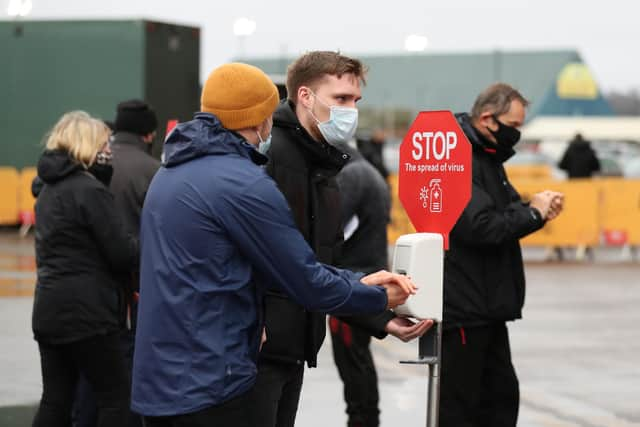'Smart' hand sanitisers trialled as part of Sheffield university research into Covid-19 workplace hygiene
and live on Freeview channel 276
‘Smart’ hand sanitisers which provide data on workplace hand hygiene will soon be tested in England as part of a study from the Universities of Sheffield and Leeds into how to best engage people with the latest Covid-19 workplace hand hygiene guidance.
The new technology uses integrated video screens to display the latest hand hygiene guidance in the workplace and provides real-time data for employers to use in their fight against the pandemic.
Advertisement
Hide AdAdvertisement
Hide AdDeveloped by hand hygiene technology company Savortex, the sanitisers can monitor in real-time how often, or not, they are used, with some able to send reminders to staff to sanitise their hands or restrict building access for those that haven’t.


The ‘smart’ devices could also be used to help companies work more sustainably by being able to schedule refilling of the sanitisers more effectively.
Researchers from Sheffield and Leeds will analyse the effectiveness of the devices based on data from the trials, along with how staff feel about integrating smart technologies into their working life.
Many people are weary of returning to busy office spaces where there may be an increased risk of transmission along with changing attitudes towards shaking hands or using door handles in public buildings - but studies show good hand hygiene can reduce the risk of contracting a respiratory virus by 55 percent.
Advertisement
Hide AdAdvertisement
Hide AdDr Sophie Rutter from the University of Sheffield’s Information School said: “In many sectors, such as healthcare, staff are compelled as part of their job to clean their hands regularly for obvious reasons of patient safety, but as we don’t really know what motivates people to wash their hands in office spaces, it can be difficult and expensive for employers to run health and safety campaigns to encourage people to follow health and safety guidance.
“We know good hand hygiene is effective at stopping transmission of Covid-19, so this project will help us find solutions to ensure office environments are safe and clean, and play their part to stop the spread of Covid-19.”
“It is so important that people adopt the highest hand hygiene standards if we are to reduce the impact of Covid-19 on our daily lives, so empowering employers to create a healthy and safe environment for everyone is not only necessary, it will also improve the wellbeing of all by reducing the risk of virus transmission in our workplaces.”
Nicholas Gill from Savortex added: “The pandemic has been the catalyst for rapid development of new and novel solutions to help stop the spread of Covid-19 and empower companies to take control of hygiene management and staff wellbeing.
Advertisement
Hide AdAdvertisement
Hide Ad"This not only reassures people returning to work that they are in a safe and secure environment, but can also help companies work smarter and more sustainably to keep their staff safe.”
Trials will start in offices in the spring, including government departments and corporate head offices.
Companies that would like to take part in the research project should contact Nicholas Gill at Savortex on +44 (0) 7767 760290, or at [email protected]